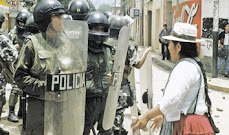Thursday, Nov. 13th, 7:00 pm
East Village Coffee
498 Washington St.
(corner of Pearl & Washington/Abrego, a block down from the busmall)
MIIS Documentary Club
Monterey Institute of International Studies, California
Tuesday, November 4, 2008
Saturday, November 1, 2008
The death of Bongani Lubisi

After watching The Big Sellout on Thursday I have been wondering about the circumstances surrounding the death of one of the people who appeared in the documentary.
Bongani Lubisi was the main person profiled from the Soweto Electricity Crisis Committee (SECC). Some of you may remember how he remarks (I'm paraphrasing) "Eskom comes and turns the power off, and then we go around and turn it back on." During the documentary he and his spouse express severe concern for his safety. During the closing credits it is announced that after they had finished filming, Lubisi had died of unknown causes at age 34.
Based on what I could find on the web, it appears he died of an illness while in the hospital and no foul play was mentioned. For more information, check out this 2005 post from the Johannesburg-based Anti-Privatisation Forum. For another profile of Lubisi while still alive, see this one from In These Times.
Jess
Sunday, October 26, 2008
The Big Sellout

Thurs, Oct. 30
7 pm
McGowan 102 (Map)
Zulu, Spanish, Tagalog, English with English Subtitles
94 Minutes
Watch a clip of The Big Sellout
“Modern warfare has tried to dehumanize people, to take out the sympathetic element. When you drop bombs from 50,000 feet, you don’t see who they’re landing on, you don’t see the damage. It’s the same thing in economics when you talk about statistics and don’t think about the people that lie behind those statistics”.
- Joseph Stiglitz, Nobel Prize Winner, former Chief Economist at the World Bank
in The Big Sellout
The Big Sellout (Germany, January 2006) challenges current economic orthodoxy in contending that the dogmatic claims of the international business establishment for neo-liberal development policies are not supported by modern economic science. More importantly, it dramatically demonstrates how the implementation of these policies is having disastrous consequences for millions of ordinary people around the globe.
Traveling throughout both the developing and industrialized world, The Big Sellout brings us face-to-face with the architects of the reigning world economic order, as well as with the people bearing the brunt of their policies. The film shows how international financial institutions such as the International Monetary Fund (IMF) and the World Bank, are demanding draconian cuts in public spending, the privatization of public services and market liberalization as the only path to economic development. Then it tests these claims against actual case studies.
The film takes us to the Philippines where we watch a desperate mother race against the clock to pay for her son’s kidney dialysis, a weekly procedure he needs to live. Similarly, we encounter a patient whose relatives must continuously pump air manually into her lungs because they can’t afford a ventilator. The film explains how the public health budget in the Philippines has undergone massive cuts since the 1980s, moving relentlessly towards a private health care system. As a result, those without resources are denied access to the vital procedures and medicines they need to survive.
South Africa and Bolivia have suffered similar traumas, as their most vulnerable populations have faced exclusion from such basic services as water and electricity. We watch as activists in Soweto, the sprawling black township near Johannesburg, regularly risk their lives reconnecting electricity for people, many of them elderly, unable to pay the rising prices resulting from the privatization of the formerly public owned electric company. Similarly, citizens in Cochabamba, Bolivia organized enormous protests in 2000, following the decision by the Bolivian government to sell the public water company to a private corporation, which would have made water cost-prohibitive to much of the population. The Big Sellout shows how ordinary people are fighting the neo-liberal commodification of basic public goods.
While national and international economic discourse is fixated on increasing efficiency and economic growth, The Big Sellout reminds us that there are faces behind the statistics. It raises serious questions about the neo-liberal credo that government best serves the public interest by becoming a servant to corporate interests. But brave individuals, like those showcased in this important new film, are standing up and demanding an alternative to the prevailing neo-liberal model, a model that the film shows to be as hollow as it is unsustainable.
Subscribe to:
Posts (Atom)
